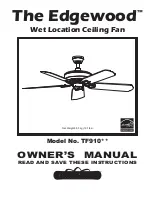
Before assembly your ceiling fan, refer to section on
proper method of wiring your fan (page 9). If you feel
you do not have enough wiring knowledge or
experience, have your fan installed by a licensed
electrician.
WARNING
!
This Manual Is Designed to Make it as Easy as Possible for You to Assemble,
Install, Operate and Maintain Your Ceiling Fan
Tools Needed for Assembly
One Phillips head screwdriver
One stepladder
One 1/4” blade screwdriver
One wire stripper
One 5/16” open end wrench, or pliers
Three wire connectors (supplied).
Materials
Wiring outlet box and box connectors must be of type
required by the local code. The minimum wire would be
a 3-conductor (2-wire with ground) of following size:
Installed Wire Length
Wire Size A.W.G.
Up to 50 ft.
14
50-100 ft.
12
Ceiling Fan Assembly
4
U.L. Model No.: CF772
1.
Remove the hanger ball by loosening the setscrew in
the hanger ball until the ball falls freely down the
downrod (Figure 1). Remove the pin from the
downrod, then remove the hanger ball. Retain the pin
and hanger ball for reinstallation in step 4.
2.
Separate, untwist and unkink the three 80” motor
leads. Route the motor lead wires through the
downrod. Align the clevis pin holes in the downrod
with the holes in the motor coupler. Install the clevis
pin and secure with the hairpin clip (Figure 2). The
clevis pin must go through the holes in the motor
coupler and the holes in the downrod. Be sure to
push the straight leg of the hairpin clip through the
hole near the end of the clevis pin until the curved
portion of the hairpin clip snaps around the clevis pin.
The hairpin clip must be properly installed to prevent
the clevis pin from working loose. Pull on the
downrod to make sure the clevis pin is properly
installed.
3.
While pulling up on the downrod, securely tighten the
two setscrews in the motor coupler.
DOWNROD
PIN
SETSCREW
HANGER BALL
Figure 1
HAIRPIN CLIP
SETSCREW
CLEVIS PIN
MOTOR
COUPLING
MOTOR
COUPLING
HAIRPIN
CLIP
SETSCREW
CLEVIS PIN
JAM NUT
DOWNROD
Figure 2
It is critical that the clevis pin in the motor coupler is
properly installed and the setscrew securely tightened.
Failure to verify that the pin and setscrew are properly
installed (as shown in Figure 2) could result in the fan
falling.
WARNING
!


































